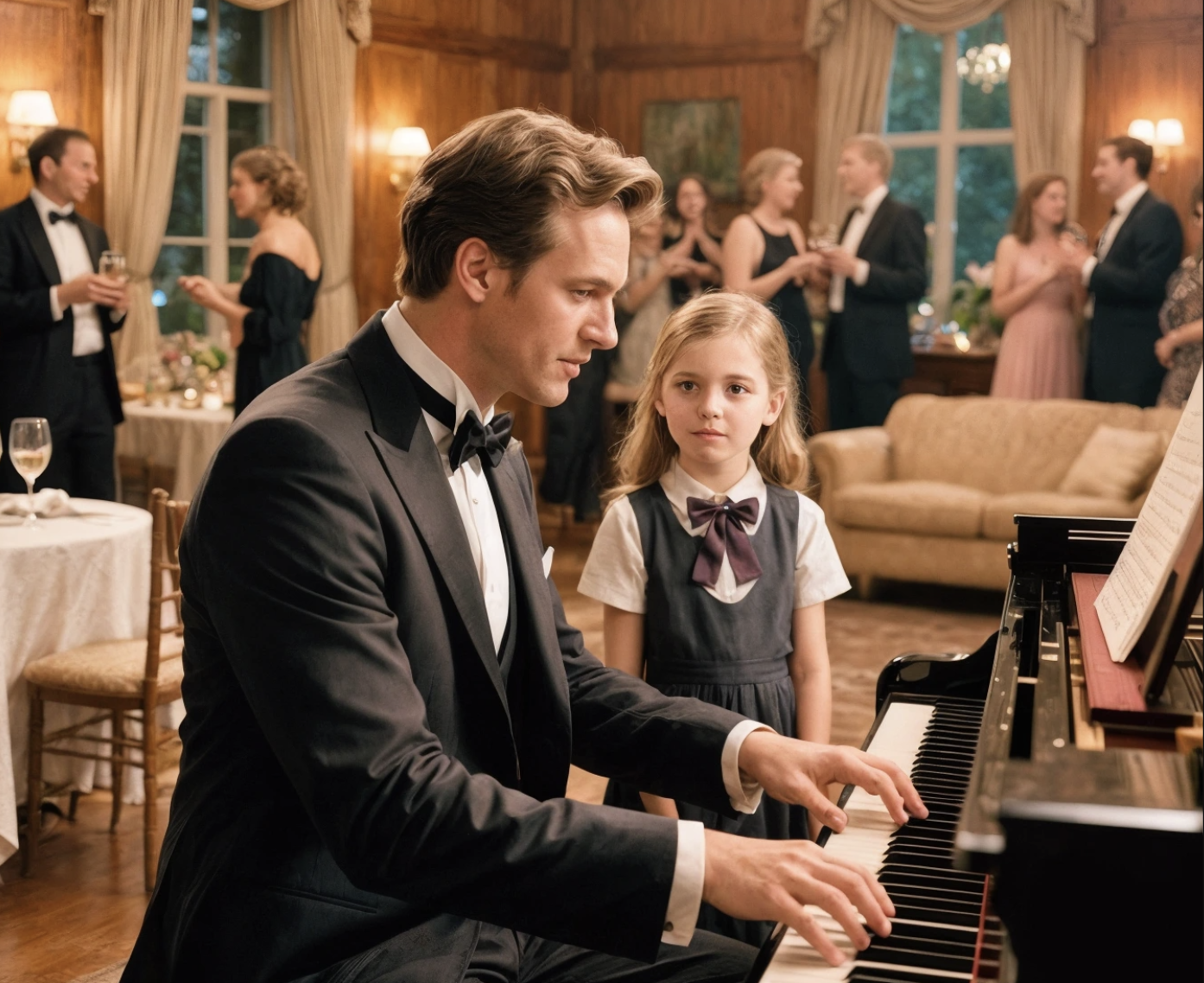Artour Lebedev was known as a man carved from ice and marble. The youngest tech billionaire in Eastern Europe, he built empires with cold logic and flawless algorithms. His name echoed in elite circles, whispered with admiration and envy. But inside, Artour felt nothing but silence—heavy, infinite silence.
He hadn’t played piano in ten years.
Once, music had been his heartbeat. Long before boardrooms and private jets, there was a dusty upright in his grandmother’s flat, and his fingers knew wonder. But that wonder had died the day she did. Since then, the Steinway in his penthouse collected dust like a tombstone.
So when the governor’s gala moved to the Grand Tchaikovsky Hotel due to last-minute flooding, Artour had groaned inwardly. Another room of tailored suits and hollow laughter, another night of masks and meaningless toasts.
He was standing by the grand bay window, glass of aged port in hand, when she appeared.
A small girl, no older than ten. Her dress was faded, the hem torn. Her shoes mismatched. She didn’t belong. And yet… she didn’t flinch.
Her gaze met his—not in defiance, but in quiet hope.
“You shouldn’t be here,” he said softly, more curious than unkind.
“I know,” she whispered. “I’m Lia.”
“Are you lost?”
She shook her head. “My mother’s serving in the kitchen. I sneak out sometimes… when the music’s playing.”
Artour arched an eyebrow. “There’s no music tonight.”
“That’s why I came to ask.”
“To ask… what?”
She looked toward the grand piano in the corner of the ballroom, untouched, more sculpture than instrument.
“I heard someone say you used to play,” she said. “Before the apps. Before the suits.”
Artour blinked. Her words—so simple—hit like a chord he hadn’t heard in years.
“You want me to play?” he asked, a small smile tugging at the corner of his lips. “Here? For this crowd?”
She nodded. “Even just once.”
He crouched a little, studying her. “Why? What would it change?”
Her answer came without hesitation. “When I hear real music… the kind that’s not from a phone or a screen… it feels like flying. Like I’m not just a girl whose mom washes dishes. I’m something more. Bigger. Brighter. The music makes it so.”
Her voice cracked slightly, but she didn’t cry. Her hands trembled, hidden behind her back.
Artour stood slowly. Something inside him stirred—a forgotten melody, buried beneath years of silence.
No one had looked at him like that in years. Not for his money. Not for his status. Just for something he used to be.
He didn’t answer her. Not with words.
He walked toward the piano.
The ballroom chatter continued, laughter spilling over champagne glasses. No one noticed until he sat down and placed his fingers gently on the keys.
The room hushed.
The first note rang out—soft, aching, familiar. A piece he wrote long ago in the stillness of grief. A piece no one had ever heard.
Gasps rippled through the guests as the melody grew. Not because it was grand or technically flawless—but because it bled emotion. Because it told a story.
And Lia stood frozen near the back wall, her small hands pressed to her mouth, eyes glistening.
Artour played as if no one else existed. Each note a memory. A farewell. A promise. He remembered the smell of his grandmother’s perfume, the cracked bench they shared. He remembered who he was before the stock options and headlines.
And when he stopped, silence held the room for a breathless moment—until thunderous applause erupted.
He didn’t bow. He didn’t smile.
He walked straight back to the girl.
“Did you hear it?”
She nodded, eyes brimming. “It was the most beautiful thing I’ve ever heard.”
Just then, a woman burst into the room, panic on her face, apron stained from hours of kitchen duty.
“Lia! I’m so sorry—sir, please forgive her! She didn’t mean to bother you, I—”
Artour raised a hand.
“She didn’t bother me,” he said gently. “She reminded me.”
The mother froze, mouth open.
He turned to Lia. “Would you like to learn to play?”
She blinked. “Me?”
“Yes,” he said. “Every week. Here. With me. If it’s okay with your mother.”
Lia looked up at her mother, who nodded in stunned silence.
“But why me?” she asked, voice small.
“Because,” he said, smiling for the first time that night, “you still believe in what I forgot. And that’s worth everything.”
